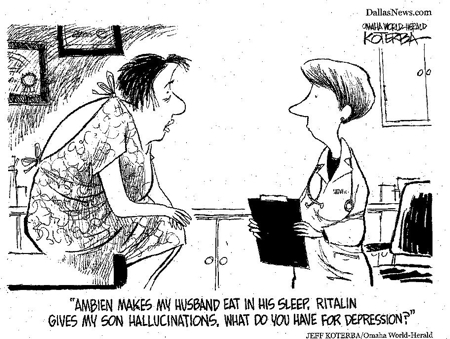Question: I have been on Prozac for several years. Recently I suffered a rather sudden and dramatic increase in depression — not crying or irritable, just totally flat line; I found it impossible to function.
My doctor increased the dosage which did not appreciably help. She then switched me to Cymbalta (30 mg. for 1 week and then up to 60 mg.). One thing to note is that I did not stop taking or decrease the Prozac first, I just switched one day to Cymbalta. During the first week I had no problems with the drug, but no real change in my depression either.
Four days after starting the 60 mg. (and when I first started to think there was an improvement in how I felt) I suffered a strange occurrence as I was dozing in & out of sleep first thing in the morning. Impossible to truly describe, but it felt like someone set off a very bright flash bulb inside my brain. This was not an external visual thing, totally “in my mind.” It was so fast and startling that I bolted straight up and cried out. I thought that a blood vessel had ruptured or I had suffered a small stroke (actually, I thought my brain had exploded but obviously since I was thinking, that hadn’t happened!) It happened two more times, just as I was falling asleep again. That night (or around 5 a.m. the next morning) I suffered 4 more of these events, and again early the next morning.
They seem to be increasing in the “violence effect” in that it seems like my whole brain lights up and I lunge awake. I do not recall any pain — just a brief state of panic. I am fully aware afterwards and I am able to think and speak coherently. I discovered this morning that while just falling asleep again, I was somehow able to sense one coming and stopped it by waking myself up first. Sorry for the long description — it’s too weird to describe.
My question is: could this be an effect of taking Cymbalta while the Prozac was still in my system (I read where you stated Prozac stays in the body for a rather long time)? As unlike any type of seizure I’ve ever heard of, could it possibly be a seizure symptom from only the Cymbalta? My own doctor has never heard of such an “event” and told me to quit taking the Cymbalta (immediately) to see if this went away. I was concerned about stopping cold turkey but am more concerned about waking to this worsening symptom one more time. Can you shed any light?
— S.S.
Answer: Since Prozac gradually leaves your system (over 6 weeks) and Cymbalta builds up more quickly (3 days), it is possible that your symptoms are due to an interaction of your two medications (due to excess serotonin levels).
I agree with your doctor that it’s not a typical presentation of symptoms and I’m not sure what it was. I am confident that it wasn’t due to withdrawal or discontinuation effects from Prozac. Rebound can cause significant symptoms, especially with Paxil or Effexor, and probably more common in kids and teens due to their faster metabolism. I also agree with getting off the Cymbalta although a slight taper might have been better.
The fact that you have been on Prozac for years means that you are not super sensitive to serotonin although it’s possible that your serotonin level was higher on the combination of Cymbalta and gradually reducing Prozac. Serotonin can produce vascular related side effects such as the auras before a migraine. Sometimes these “pre migraine” symptoms don’t progress to an actual headache.
Cymbalta modulates serotonin and norepinephrine. It may be that you don’t tolerate the norepinephrine. You might have had hypnogogic and hypnopompic hallucinations that occur going into and coming out of sleep. They are actually considered normal phenomena although the frequency and severity of your episodes was certainly not normal.
There’s no way to be sure what the exact cause was – either in terms of what the meds were doing or what was happening in your head. In my opinion, the safest thing to do would be to use meds that work through different mechanisms like Lamictal. If episodes persist you should see a neurologist for evaluation and testing or have a sleep study.
Good Luck!
Dr. Jones
This article originally appeared in the Q&A section 05/31/2005. Revised 01/22/2006.

